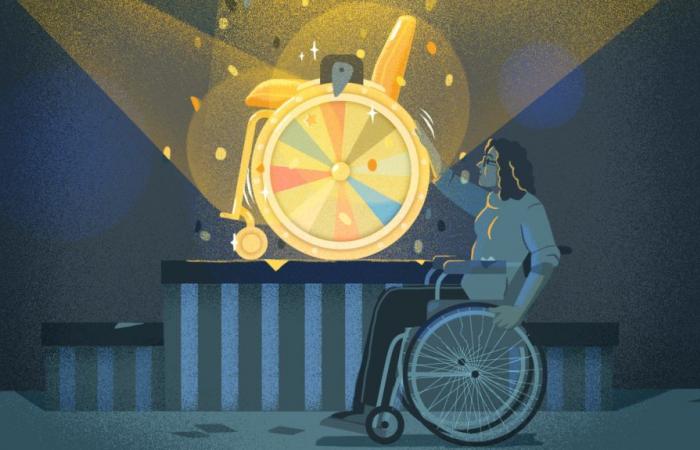The full reimbursement promised by Emmanuel Macron is slow to materialize. In the meantime, people with reduced mobility find themselves out of pocket by several thousand euros, while others even give up chairs adapted to their situation.
“Able-bodied people don’t pay to walk. Why should we, disabled people, have to break the bank to get around?” For five years, Maud Pochic has used a wheelchair whenever she leaves her house. Suffering from Ehlers-Danlos syndrome, a debilitating disease that causes fatigue and chronic pain, this 24-year-old student opted to rent a standard model, the same one that helps accident victims in hospitals or the elderly in hospitals. Ehpad. “It is fully covered by Social Security, but it is absolute low-end”she describes.
His manual chair is a 16 kg rolling anvil, “not at all manageable”which damages his body and exhausts him. “Three quarters of the time, I need someone to push me, so I give up going out. It deprives me of my autonomy and it harms my studies and my social life”deplores the young resident of Saint-Avertin, near Tours (Indre-et-Loire). At the dawn of her working life, she is now eyeing the purchase of a model adapted to her situation, still manual, but twice as light and manageable.
“This new chair is simple: it’s the key to my inclusion.”
Maud Pochic, studentat franceinfo
But at what cost? The quote shows 3,700 euros. “And again, I aim for the minimum adaptation, otherwise I would easily get it for 5,000 euros”insists the student. However, for the purchase of a manual wheelchair, Social Security only reimburses around 600 euros. “After my mutual insurance, I will have 1,700 euros left to come out of my pocket”calculates the young woman. “I can’t afford it.” For months, she has been condemned, like so many other users who responded to our call for testimonials, to look for a solution elsewhere. Departmental aid, perhaps, a family helping hand or government reform.
On this Tuesday, December 3, International Day of Persons with Disabilities, the question of wheelchair coverage in France could have been an old affair. In April 2023, facing prices “so exorbitant” of these vehicles, Emmanuel Macron announced that they would be “fully reimbursed (…) from 2024”. “A measure of social justice”had argued the President of the Republic. Twenty months and one dissolution later, the realization is still pending.
A draft was indeed presented at the start of the year, but the text made players in the sector jump. The project provided for full coverage for certain models (charged up to 2,600 euros for a manual chair and 18,000 euros for an electric one) and a total absence of reimbursement for all those who exceed these ceilings. However, adapted armchairs, like the one that Maud Pochic covets, often exceed these amounts.
“Many users with disabilities would have been excluded and would have seen their situation worsen, no longer being able to claim anything”assures Malika Boubekeur, from the APF France handicap association.
“The current system is unsatisfactory. It must be improved, not made worse.”
Malika Boubekeur, national advisor for AFP France handicapat franceinfo
What will become of the commitment of the Head of State under the government of Michel Barnier? The office of the Minister Delegate in charge of People with Disabilities promises to honor it in the coming weeks. “Consultation has resumed and we hope to complete the file before the end of the year, for effective implementation by September 2025”detail Charlotte Parmentier-Lecocq’s teams. “We want to achieve full reimbursement for the chairs, with safeguards to avoid holes in the racket.”
Without waiting to know what sauce the reform will be served with, the environmentalist deputy Sébastien Peytavie tabled a bill in September on the full reimbursement of wheelchairs by Health Insurance. Even if it means short-circuiting the executive. It thus intends to guarantee that each model, whatever its price, is fully supported. But the terms of financing and application of its measure still remain uncertain. His bill, adopted unanimously in committee on November 27, will be debated on Tuesday December 3 or Wednesday December 4 in the National Assembly.
Total support “from 2024” ? The presidential promise resonated as far as Isle-Aubigny, a small rural town in Aube. Claire Andriot clung to it. For eight years this 49-year-old woman has been using the same manual chair, which squeaks, loses pieces and breaks her back. “I can no longer see it in painting”she rages. In theory, this survivor of a road accident could have been eligible for renewal after five years, as allowed by Social Security. Except that the bill was going to be hefty and she decided to delay the deadline.
“When we were promised a full refund, I waited, telling myself that it would take a few months”says this single mother. In vain. In September, she ended up ordering a new chair. The same model, no madness. “Its price is 5,500 euros. Once Social Security and mutual insurance are over, I have 3,600 euros left to pay”she gasps. “I had to suspend the order ten days later because a car breakdown put me in the red. How do you expect to do with 1,000 euros of allowance for disabled adults, a house to finish paying off and three student children to help?”
“How do you expect to live properly in an armchair? I’m fed up, it’s demeaning.”
Claire Andriot, motherat franceinfo
With electric models, the bill is even heavier, with out-of-pocket costs reaching five figures. Marceau Steinbach knows something about this. After having “asked for all possible help” for his chair at 34,000 euros, this jovial 60-year-old from Marseillais ended up with a painful cost of around 18,000 euros. “I have no choice: since I have been in a wheelchair, I have developed morbid obesity. I need bariatric models, which cost three times as much. I would dream of driving a 2 CV, but no, I have to buy me a tractor.” This account manager on disability had to dig into his nest egg and take out a bank loan “more than 10,000 euros” with his spouse. “Without him, I don’t know where I would be.”he testifies.
Fabienne Bénassis decided to launch an online prize pool to acquire a model for 29,000 euros. “My chair is so tired that it freezes and sends me anywhere, not to mention the batteries are dying. I no longer dare take the bus or the metro”testifies this resident of Cesson-Sévigné, in the urban area of Rennes. She has already received nearly 9,000 euros in donations from her family, friends and those around them, which will not be enough to cover her remaining expenses. At 51, she plans to borrow from her relatives. “The chairs are becoming more and more expensive, but the aids are not moving”deplores this beneficiary of the allowance for disabled adults. “These financial constraints make me very anxious and the stress aggravates my illness.”
More than the rest of the burden, it is sometimes the administrative struggle to obtain funding which most burdens people in wheelchairs. Health insurance, mutual insurance, departmental center for disabled people, funds for the integration of disabled people into the public service, etc. “It’s an obstacle course”sighs Isabelle Terrasson, a 40-year-old hospital nurse, who says she had to fight for two and a half years until her chair was fully taken care of in 2022. “In the meantime, I was moving around with a completely unsuitable chair, which caused me several joint injuries”she emphasizes, from Dammartin-en-Serve, in Yvelines.
“I worked on morphine with a chair that destroyed my shoulder. I cried every day.”
Isabelle Terrasson, nurseat franceinfo
The youngest are not spared. Every day, Séverine Sucra sees her son Maceo, aged 19, distort in an electric chair that no longer fits him. “He got it at 15 and has had a very strong growth spurt since.”describes this psychotherapist from the Toulouse region, who initiated renewal processes two years ago. “Health Insurance initially refused to finance a new one”she laments.
“I had to file an appeal and threaten to take legal action to end up winning my case at the end of September.”
Séverine Sucra, mother of a disabled boyat franceinfo
And to regret: “In the meantime, his back twisted, his hips shifted and the physiotherapist’s efforts were in vain.”
To cover expenses linked to their son’s disability, Séverine Sucra and her partner founded an association, Hissez Haut Maceo. “It’s a lot of mental load for me, but it allows us to organize charity events and benefit from tax-free donations”she describes. Thanks to this organization, the couple pays the bills and survives. “But how do people do it alone, without means, without energy? I wonder if everything is not done to get us through exhaustion and so that we give up.”






